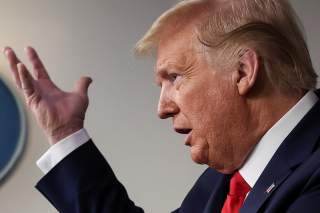Coronavirus Economic Stimulus Plan: How Will Congress and Trump Save the Economy?
Time to send checks? A payroll tax cut? What will work?
Today the U.S. Senate is expected to vote on the coronavirus relief bill passed by the House on Friday. Negotiated by Speaker Nancy Pelosi and Treasury Secretary Steven Mnuchin, the bill would ensure testing for the coronavirus would be free, expand food assistance programs, and provide paid family leave for individuals affected by the nationwide business shutdowns. Projected costs for the bill are $104 billion.
“A number of my members think there were considerable shortcomings in the House bill. My counsel to them it is to gag and vote for it anyway,” Senate Majority Leader Mitch McConnell instructed fellow Republicans.
But for what comes next, senate Republicans find themselves divided. There is broad agreement among the caucus that a kind of economic stimulus is required, but they’re at odds about how large and how direct the stimulus should be.
President Donald Trump’s original proposal of a payroll tax cut has been abandoned, and the administration, with Mnuchin has its economic spokesperson, favors direct assistance. “We’re looking at sending checks to Americans immediately. And what we’ve heard from hardworking Americans, many companies have now shut down, whether it’s bars or restaurants, Americans need cash now, and the president wants to give cash now,” Mnuchin told reporters yesterday. “And I mean now in the next two weeks.”
“There are some numbers out there,” Mnuchin teased, when asked about the size of the checks. “They may be a little bit bigger than what’s in the press.”
Individual senators have thrown out their own numbers. Senator Mitt Romney of Utah, who was the Republican presidential nominee in 2012, is a lifelong Keynesian, believing that government spending is the primary driver of the economy. He has proposed a one-time payment of $1,000 to every adult American.
Senator Tom Cotton of Arkansas, a hawk on both foreign policy and immigration, favored a more stacked payment. Under his plan, Mnuchin’s Treasury Department cut a tax rebate of $1,000 for every taxpayer with an annual income under $100,000, along with an extra $500 for every dependent.
Many Republicans oppose these payment plans. “It won’t help the economy just throwing money at a problem,” said Lindsey Graham of South Carolina. “I don’t know why giving a thousand dollars on top of their paycheck makes any sense now because there’s no economy to participate in. I’d rather take that money and shore up health care systems.”
Meanwhile, Senator Marco Rubio of Florida is talking about loans to small businesses so they can keep their employees paid, and Senator Mike Braun of Indiana is trying to revive Trump’s original payroll tax cut.
Senate Minority Leader Chuck Schumer had earlier proposed a $750 billion stimulus package. Republican proposals range in cost from $250 billion to $850 billion, and even close to a trillion. But before they can vote, Republicans will have to come to a consensus.
Hunter DeRensis is a senior reporter for the National Interest. Follow him on Twitter @HunterDeRensis.

